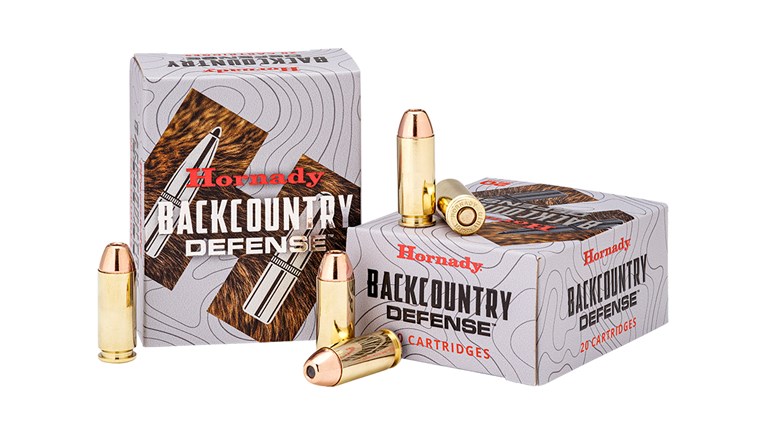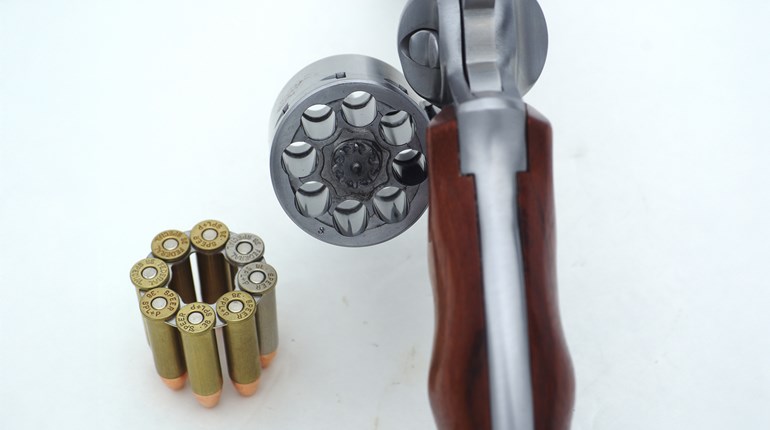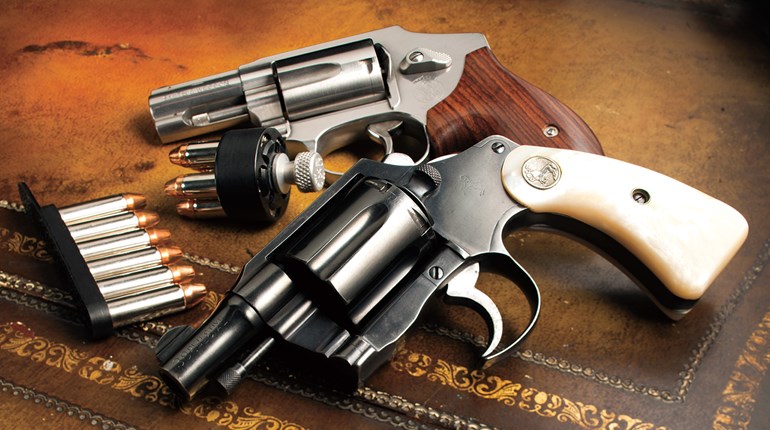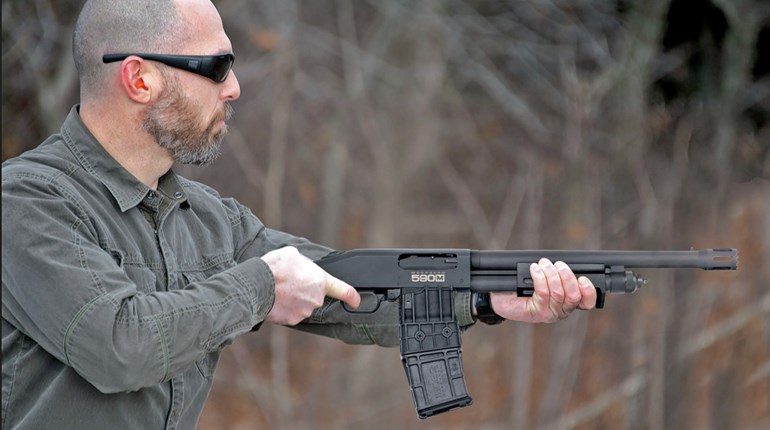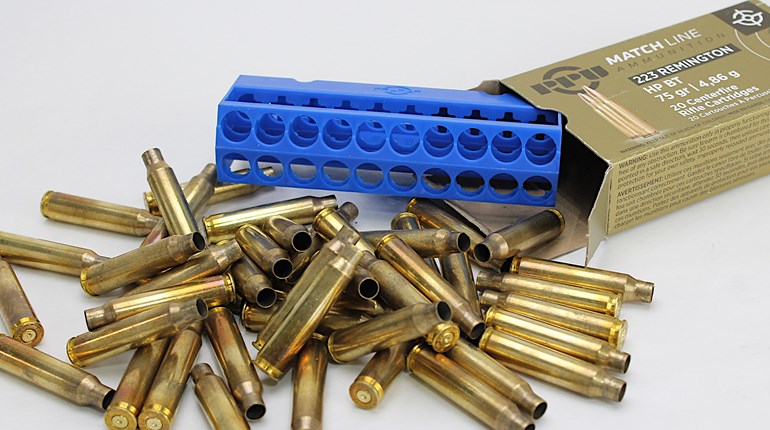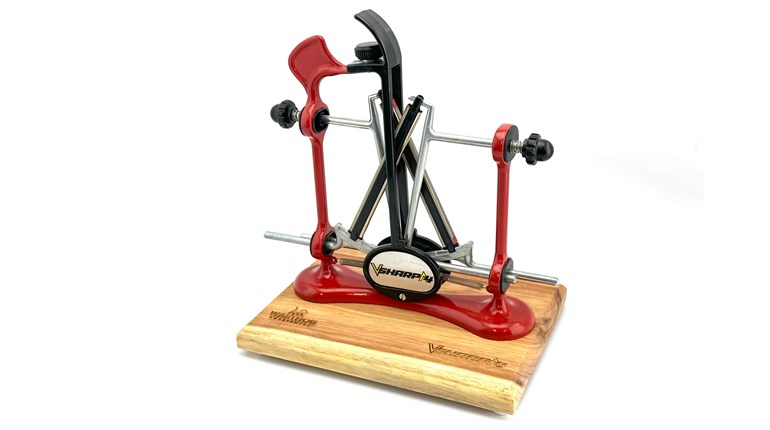
Believe it or not, some citizens shoot better with a revolver than with a semi-auto pistol, and in the real world, slower hits are better than faster misses. It doesn't matter whether one chooses a revolver because of a deep-seated bias or simply because the revolver seems safer. The concern is whether the individual truly surrenders any capabilities by choosing a wheelgun in a self-defense scenario. Forcing a citizen to use a tool with which he or she is less comfortable may be a mistake since it will require considerably more training to master the new handgun and gain the confidence necessary to use it for self-defense. I would suggest little is sacrificed if a revolver is selected for home defense.
The original duty-size Model 1911 magazines held seven rounds of 45 ACP; magazines today typically hold either seven or eight rounds. Smith & Wesson's "duty-size" M&P N-frame—the R8 revolver—holds eight rounds of .357 Mag. or .38 Spl. Both guns have 5-inch barrels. Some 1911s have a rail for a weapon light. The Smith & Wesson M&P R8 has an integral light rail. In order to verify the condition of a 1911, the magazine must be removed and a chamber check performed. A glance at the back end of the M&P cylinder instantly reveals whether or not there are rounds present. In poor light, swinging out the cylinder confirms condition.
Recommended tactics for dealing with a threat at home suggests you retreat to your designated safe room, call the police and be prepared to deal with any threats entering your safe area. To paraphrase Clint Eastwood in the movie "Unforgiven," you should arm yourself. In this case, your revolver carries eight rounds with which to do that. Since you're holding a fixed position and not moving through the house, you simply need to have a reload close to where you keep your revolver. Smith & Wesson's M&P revolver has a relief cut into the breach face of your revolver so it will accommodate moon clips, meaning if you shoot all eight rounds, you can dump the rounds and moon clip with a stroke on the ejector rod and insert a new clip holding an additional eight rounds. It won't be as fast as a magazine change in a semi-auto, but it's considerably faster than replacing the rounds one or two at a time.
Warning: spend some time practicing the reload with a full moon clip. You might want to replace the factory grips with a set sporting thinner panels or dish out the left side to facilitate insertion of the loaded moon clip. In this safe-room scenario, I wouldn't worry about a tactical or partial reload where you eject and replace only those rounds that have been fired. When you're crouched behind your bed or some heavy piece of furniture, tactical reloads with a revolver become considerably more difficult than when standing upright on a square range. If you run the gun dry or just think you might need a reload, eject the entire moon clip and insert a full one.
At 10.5 inches in length and weighing 36.3 ounces, the R8 is a large handgun. Should you prefer a smaller revolver while maintaining the eight-round capacity, check out Smith & Wesson's Model 327 with its 2-inch barrel. Like the M&P, it has a scandium-alloy frame but it's cylinder and barrel shroud are made of titanium alloy instead of steel, shaving off nearly a pound.
The Model 327 lacks the M&P's adjustable rear and interchangeable front sight and comes with a red ramp front sight and fixed rear consisting of a square notch. Both guns are capable of precise double-action shooting due to the Performance Center-tuned actions and triggers with overtravel stops. I found it quicker to load the Model 327 with full-moon clips due to its wood grips being slightly slimmer than the synthetic grips on the M&P, but this is something easily remedied. Both revolvers have large hammers and are capable of single-action firing, so if distances increase, simply cock the hammer for more precise shot placement at the longer ranges. In a safe-room defensive scenario, there's probably little possibility of a shot beyond 15 yards, but if you're on the road with your revolver, threat distances can increase beyond your expectations. And if you consider handguns nothing more than close-range fighting tools, I assure you that 50- to 100-yard shots on man-size targets with a duty-size pistol wearing good iron sights are not beyond the abilities of most shooters, given proper training.
There are some potential concerns only you can address. If you have small hands and/or short fingers, you may not be able to successfully run an N-frame Smith & Wesson in the double-action mode. But one of the first two steps in selecting any defensive handgun is to determine if it fits. (The other "first" consideration is whether or not the gun is reliable and Smith & Wesson has been satisfying that need for Americans for more than a century.) Once you decide the wheelgun fits, you must determine what level of recoil you can tolerate and still be effective in defending you and your family. Full-strength .357 Mags may be too much, particularly in the lighter weight Model 327, in which case you should look at the .38 Spl. ammo designated for self-defense. Much of this ammunition uses lighter-weight bullets whose performance has been successfully demonstrated for various enforcement agencies throughout the country. Recoil is considerably less than .357 Mag. and the ammunition is available to citizens.
If you're thinking of concealed carry and concerned about the size of an N-frame, I can only offer the following comments. I frequently hunt with a Smith & Wesson Model 629 wearing a 5-inch barrel. In any kind of inclement weather, it's generally "concealed" in a shoulder holster under a coat. Not a fast-access rig, but it is out of sight. Absent rain or snow, I carry it in a relatively high-riding hip holster, and barring any Superman acrobatics in the field, (which I don't do anymore) it stays concealed under nothing more than a lightweight jacket. In the belt holster, the hammer rarely poses a problem during the draw stroke, as long as my shirt is reasonably well tucked-in and I properly "sweep" the jacket clear of the grip. Last year, I actually ran through about 300 rounds of ammo with an N-frame Smith & Wesson during some drills in a class at Gunsite. Like anything else, proficiency increased the more I practiced.
I'm not trying to convince you to acquire an eight-shot revolver for self-defense even though I think they're a viable alternative to a semi-auto pistol, particularly in regions where politicians have restricted magazine capacity to 10 rounds. On the other hand, if you have a preference for revolvers, for whatever reason, don't let someone else talk you out of relying on one just because wheelguns are no longer de rigueur. Revolvers got the job done for generations of cops, and you'll be carrying two more rounds than they did.










